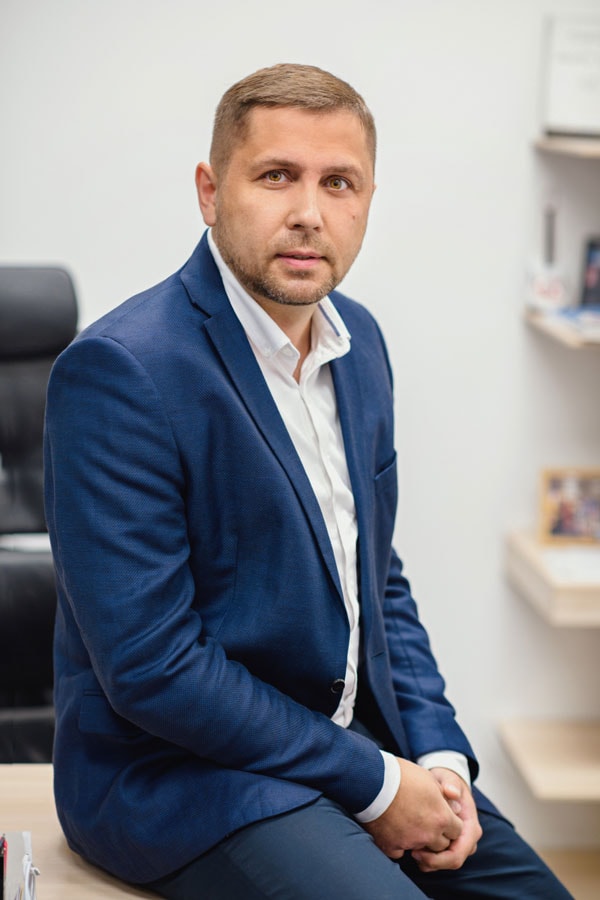
Interview with Dmytro Nechytailo (Partner, Advisory Leader at PwC Ukraine)
03/12/21
About feeling himself at home in PwC, frankly about the "pandemic" crisis and why people have been and remain a core value in his team.
Dmytro, can you share how you joined PwC? Why did you choose PwC?

Dmytro Nechytailo (DN): I have a long and interesting history with PwC. It started back in 2008. At the time, I had worked in banking for nearly 5 years, although I had never thought of myself as a banker. This is because, even at banks, consulting had always been my area of focus. Internal consulting, that is. This covers everything relating to optimisation of business processes, organisational structures, project management, implementation of technology transformations. In other words, I never issued loans or processed payments. So, technically I was a banker, but not quite.
In mid-2008, certain HR changes at the Management Board level were happening at the bank and there was a feeling of uncertainty. It was therefore natural that I, along with many others, was exploring other opportunities. Or, in simple terms, I began considering finding a new job with varying degrees of urgency. There was a manager opening in Consulting listed on PwC website. This was an experienced hire opening (to use our terminology). In other words, an experienced candidate. And I applied for this job.
Then there was a series of interviews, testing (I’m still proud to have passed the numerical test, i.e. basically maths, with the highest score). Ultimately, I got a much-anticipated job offer and proceeded to report this fact to the newly-appointed Chairman of the Management Board, who had just taken the office. We had not even met at that point.
I have no idea why, but I was actively encouraged to stay. This came with an offer of a promotion and a new set of authorities. So I stayed. I declined PwC’s offer and stayed for 2 more years.
As I eventually understood, this was the right decision. A couple of months later, the infamous 2008 crisis kicked in, bringing on mass-scale lay-offs. As a new joiner, my chances to keep the job would certainly be remote. However, this is just guesswork on my behalf.
In any case, I spend 2 more years working at the bank. I achieved excellent results, gained new experience with a new team and implemented numerous critical projects for the bank.
Amazingly, both PwC and I never forgot about each other. I will be honest, I sometimes dreamt of the PwC office at night. It is hard to explain. Subconsciously, I longed to be there. I have to add that the PwC recruitment team is also great. For some reason, they also remembered me. Each Christmas and each birthday, I received congratulations by text message. And then, in the summer 2010, I received a phone call with a new offer. This time, there was an upgrade: Senior Manager, Advisory Financial Services Leader. From September 2010, I joined PwC team.
So why PwC? For me, it is both a learning opportunity and a family. An opportunity to learn the culture. The culture of business, teamwork, being professional in everything you do. This culture stays with you for life. You never forget it as long as you live, even when you are no longer at PwC.
And a family. It is not the same kind of family you have at home. It is a family in terms of values and helping each other. PwC office does not make me feel worse than I feel at home. It is just different. Still, every morning you come there as if you were coming home. It is just a different kind of home.
So, what it's like to be a Big Four partner?
DN: Generally speaking, being a partner is a job like any other. It is just about the degree of your responsibility. Responsibility to the client, to your team, to your firm’s brand, and ultimately, to yourself. Responsibility not just for your own performance but that of the entire practice.
Clients who have had a chance to work with myself and my team tend to come back again and again. Not every project is equally smooth. Everyone stumbles. Together with the client, we have often moved through some hard times but invariably arrived at a successful outcome. This is exactly why clients come back, understanding that we will always deliver, no matter how hard the journey is. It is about delivering a high-quality outcome. This is exactly what a partner’s responsibility is all about.
At the same time, you cannot use just any measures, wade through slaughter, wreck your team, ignore obvious risk. And this is another task a partner has, finding exactly the right balance between quality for the client and wellbeing for the team.
Can you tell us more about your business? How is it organised?
DN: All Big Four firms in Ukraine are somewhat similar in their internal processes, yet there are many differences. This is also true for my practice. It is structured somewhat differently from our competition.
Translated literally from Ukrainian, we call the practice ‘consulting services’. However, in English, the practice is called Advisory and comprises 3 traditional PwC areas: Consulting, Deals and Forensic (anti-corruption and anti-fraud services). I am responsible for all 3 areas.
Yet, no partner is equally knowledgeable in every area. This is why each partner in our firm has accreditations. I am accredited for Consulting projects, and for other areas, I rely on help from partners who hold the respective accreditations. By ‘help’ I mean that they are accredited to sign off respective reports (e.g. valuation reports, forensic reports, etc.).
In Consulting, we assist our clients in gaining better understanding of their business in terms of strategies, structures, business processes, IT, functional transformations.
Our Consulting practice covers two teams: Private Sector Consulting and Public Sector Consulting.
It is important to note that Public Sector Consulting was our trademark service between 2014 and 2019 and we are well entitled to claim that we are market leaders in this sector. Starting from 2019, Private Sector Consulting has been growing exponentially and currently these two portfolios are similar in size. By the way, the biggest number of openings is currently in our Private Sector Consulting.
Our Deals team also covers two areas, Transaction Services and Corporate Finance. The first team assists our clients with due diligence. Corporate Finance is responsible for valuation (valuation of business, trademarks, fixed assets, etc.), business restructuring, fundraising, financial models, feasibility studies for future businesses. I would like to note that our Corporate Finance team has been in the greatest demand in the last couple of years.
And our third team, Forensic, is probably the most romantic of all. They are sometimes referred to as the detectives. And for a good reason. It is a very strong and experienced team helping our clients with various investigations. These are mostly investigations of corporate fraud. Our Forensic colleagues also deal with anti-bribery/anti-corruption projects and advise on compliance matters. Our new service area within Forensic is FTS, Forensic Technology Services. This is a full-scope technology lab at PwC Ukraine. The lab is designed for work with digital devices in order to extract data for investigations.
However, our Forensic team is not only about the detective work. The guys also advise Ukrainian (and not only Ukrainian) law enforcement authorities and are considered to be the Centre of Excellence in this area in CEE (Central and Eastern Europe) region. This is a story that deserves its own publication.
How can one join PwC? What skills and knowledge are required for that?
DN: Of course, the aspiration is always essential. Our employees are mostly alumni of economic universities with degrees in Economics, Finance, Management, Marketing, Accounting, Economic Cybernetics. Holding such a degree is a baseline. English skills are important. The candidate should have at least upper-intermediate fluency. Being proficient in Ukrainian and Russian is a default expectation.
It is a plus to have skills such as information research, working with big data, basic programming/modelling in Excel, preparing presentations. I am now obviously generalising these skills for junior hires (candidates with no or entry-level experience) and for Advisory in general. At the same time, more specific requirements can apply for individual teams within Advisory and particularly for experienced candidates.
We normally post our openings on our corporate website. There are multiple career opportunities on our website as we speak, and there is quite a lot of them! Links to career opportunities are also posted on social media, such as Facebook, Instagram, LinkedIn. All the applicant has to do is follow the link and he or she will be taken care of by our recruiters who will guide him or her through the entire process.
Is it true that working for a Big Four firm leaves no time for personal life?
DN: Completely not true. It is one of the most common myths about Big Four firms in general. One qualifier here is that our assurance team is different in terms of seasonality of their work. This means that people work a lot (sometimes too much) during the season, which is normally from October till April, and they work very little or not all - by taking long time off - outside of the season. At the same time, there is no, or almost no, seasonality in Advisory. Traditionally, business activity is lower during the second half of the summer, when people go on holidays, and of course between late December and mid-January. The rest of the time the pace of our business is relatively even and so is the workload. Excessive workload may sometimes occur during the peak periods of some projects. Weekend work is rare and is paid extra. The hours are very flexible. Due to the pandemic we follow a so-called hybrid model that calls for working at the office at least 3 days a week. The remaining 2 days the employee can work remotely and plan his or her time during the day accordingly.
As for time off, it is not merely allowed but we sometimes all but beg our staff to take time off. Traditionally the firm gives 2 additional days off - around Christmas and mid-year - to each employee and also organises summer and winter parties (that always fall on a weekday), which provide time off work for everyone at the same time. For Advisory, we have our traditional annual Away Day, which usually happens in the autumn somewhere outdoors, with a sleepover, entertainment and a complete ban on business talks, as well as our quarterly Advisory Beer Parties.
How has COVID-19 changed the market? Did the needs of your clients change among other things?
DN: It is natural that in any crisis situation, clients are looking to optimise their cost budgets as much as possible, and this inevitably reflects on demand for many services, including consulting services.
Yet, there was no drama in the consulting market. Launches of some projects were rescheduled, a limited number of projects was cancelled, mostly during lockdowns. However, large businesses never stopped operating and continued actively working with consultants.
It is an entirely different matter, though, that Ukrainian businesses are maturing, along with the country in general. COVID merely provided an impulse to accelerate this maturing process for many companies. And being mature always comes with independence. To this end, many have learned - and quite successfully - to deal with matters that used to require involvement of an external consultant. Therefore, we have seen reducing demand for traditional consulting (I understand traditional consulting as strategy development, organisational design, business process optimisation, among other things), which is being replaced by more specialised consulting. It does not mean that businesses no longer engage us for organisational reviews and process reengineering. What happens is that these engagements now cover individual functions rather than the entire business. And, of course, very few organisational transformations have value without an IT/digital component. So, the share of IT consulting has been on the rise.
As another characteristic typical for today's market I would name the demand for the so-called Managed Services: in our terminology, this is essentially outsourcing of our staff to perform the client’s highly specialised tasks on a regular basis. Such a model is often more cost effective for the client than setting up and maintaining new functions internally.
However, although Ukrainian business have been maturing, they are still hard to compare with the maturity of our immediate neighbours, such as Poland or Slovakia. Therefore it makes little sense to just blindly copy and paste consulting experience of these countries. While traditional consulting in these countries has shrunk to almost non-existent, many Ukrainian businesses will still focus on internal organisational matters for a few years to come instead of chasing the latest technologies. The rule of thumb is that you should not automate or digitise the chaos, which is inevitable when crisis periods alternate with rapid growth.
How are you dealing with the pandemic and what are the main challenges your business faces right now?
DN: Just as everyone else, we found ourselves amidst complete uncertainty in the spring 2020. Back then, it appeared that everything had frozen around us and it was unclear what to do: continue operating as before, take some urgent measures or choose to do nothing. We survived a period of certain crisis response measures, which was, luckily, brief. We then survived another lockdown in early 2021, which was hard for everyone, and began gradually returning to the pre-COVID pace of business starting from this summer. We expect to fully return our normal business volume during the 1st quarter 2022.
People are the main challenge. This situation was also affected by the pandemic, and working remotely did not help, if I am completely honest. I am only talking about my own practice here, since I know of successful remote work cases. And even then, to be honest, I have little faith in them as a long-term solution.
The main problem of remote work is that the employees eventually lose their association with the employer. I have often repeated a phrase: if you sit on your sofa wearing your pyjamas with a sandwich in your hand and a laptop on your lap, you will eventually stop caring what logo is printed on your business card. For an employee working remotely on a permanent basis, cash becomes the only incentive. Nothing more. All the other incentives just fade away. And so tomorrow your employer will be anyone who pays extra 500 dollars. Essentially, you stop being a part of your company and become a freelancer of sorts. And so, while for some companies this business model may work quite well, it is not the case for us, where people are our main capital.
This is why people are our paramount area of focus right now. We have implemented a ‘hybrid’ working model, which leaves a certain degree of flexibility to our employees and yet enables them to feel part of the team by working at the office.
Today's young professionals change jobs very quickly and easily, chasing the big buck right now and not in a year of five. We understand all that and have increasingly focused on the right and very careful communications that clearly describe the career and development path at PwC as opposed to quick cash today with unclear prospects in a 3 or 5 years’ time.
What does tomorrow hold for us after the pandemic is over? Is it true that everything will be completely different than before?
DN: Everyone and his brother repeated this line, ‘the world will never be the same’, in the summer 2020. However, no one would specify for whom it would never be the same. I think there will be no dramatic change for 70% professions, particularly in emerging markets. Laying asphalt, moving waste and putting fillings in your teeth can be quite problematic remotely. One needs to go to work, then. And using punch lines such as ‘I will never go back to the office’ is at the very least insensitive towards those occupations who will never be able to afford something like that. One may go to absurd lengths and start speculating about equality and inclusivity by asking why people in some occupations have a chance to drink their coffee sitting on a sofa with their laptop while others will never have this luxury.
This is why I support common sense and no one-size-fits-all approach. The world we live in changes daily in response to specific circumstances. While some things evolve at the speed of light (and the pandemic has been an important catalyst here), many traditional values, both tangible and intangible, are here to stay. I may sound old school, but in a decade from now, we will not all communicate using holograms and enjoy visiting Paris museums wearing 4D goggles. Going to a pub for drinks will still be infinitely cooler than a zoom party even in 15 years from now. Digitisation should not happen for the sake of digitisation. Take normal socialisation away from a person and they will condemn anything digital.
It is important that this message comes across to many of today's businesses who have gotten heady with success in this period of the pandemic and widespread remote work and decided that digital is the be-all and end-all. While I welcome the growth of IT and digital business, I already express concern over certain ‘overload’ of this topic in the market. We will be lucky if the overload is replaced by gradual cooling rather than by burst of this bubble.
In your opinion, why is Ukraine still waiting for its economic breakthrough similar to that of our Western neighbours?
DN: I will say nothing new except the threadbare argument about the rule of law. Ukraine has made tremendous progress in many areas. Ministries and other authorities have received unprecedented support and implemented some good reform or just nice perks. This applies to both digital transformations and a solid legal framework to attract investment into the economy. One thing we were mistaken about is our priorities.
All our digital and investment perks are amazing but, unfortunately, they are nothing but a flashy wrapper in the absence of any massive shifts in the fundamentals. And these shifts are yet to come.
Having your ID in your smartphone is as great as having an investment nanny law. Yet, a country with the rule of law will be equally happy with or without it and a country without the rule of law will be equally unhappy and inefficient with any perks.
And a final question: how can a client contact PwC? If there is an issue, can one call you or send an email?
DN: Despite all presumptions, PwC is a very open firm. We have our presence on almost every social media platform (Facebook, LinkedIn, Instagram). Our website is always up-to-date, both in terms of news and descriptions of our services. And by the way, our website has a form that one can fill out to request consulting services. And, trust me, this form works. All requests reach their destination, including my personal inbox.
I also have a personal account on Facebook and LinkedIn and I always make sure I reply to my messages! So, stay in touch!
Contact us









